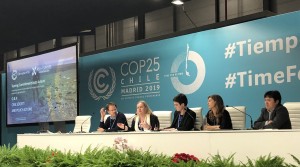Mitigating plastic-related greenhouse gas emissions should be top priority according to the latest update on plastics from the UN Climate Change Conference, COP 25, held this month in Madrid. Systemic change is how it could be done.
As part of the official programme of the annual UN Climate Change Conference, COP 25, in Madrid, Spain, the EIT Climate-KIC convened leading stakeholders to discuss the mitigation of plastic-related greenhouse gas emissions. The focus was on turning global commitments into actions, notably through an approach based on systemic innovation.
 The stated goal of the event was to bring leading policy experts and stakeholders together to draw attention on an overlooked driver of global carbon emissions: the plastics industry. Participants, who included government, civil society, and private sector representatives from Europe, Asia, and Latin America, discussed the urgency to overhaul of the whole plastics value chain.
The stated goal of the event was to bring leading policy experts and stakeholders together to draw attention on an overlooked driver of global carbon emissions: the plastics industry. Participants, who included government, civil society, and private sector representatives from Europe, Asia, and Latin America, discussed the urgency to overhaul of the whole plastics value chain.
The discussions were moderated by the EIT Climate-KIC, Europe’s largest public-private partnership with the purpose off tackling climate change through innovation, and the event was co-organised the Asia-Europe Foundation, a non-for-profit intergovernmental organisation that focuses on developing networks that help strengthen Asia-Europe relations by setting up platforms for shared learning experiences and the exchange of idea.
The group agreed that radical collaboration is needed to quickly tackle the growing plastics crisis. Patrick Bürgi, co-founder of South Pole highlighted that: “If we don’t take rapid action, the plastics value chain will consume 15% of a global carbon budget by 2050. Compared to climate change, tackling the plastics challenge and its associated emissions is a lot easier. There is less money, less pollution, and less sectors involved – overall, less hassle to solve. Taking coordinated action today would be a win not only for the plastics crisis, but also the global climate crisis.”
Beyond collaboration, the group discussed the importance of addressing the problem through up-stream solutions. Veronica de la Cerda, CEO of Triciclos, commented that: “At Triciclos, we believe that waste and its impacts on the environment is a design error. Tackling plastic pollution requires changing the design process. Globally, we need to completely re-design product and service models to align to circular economy paradigms.”
Dr. Nguyen Trung Thang from the Ministry of Natural resources and Environment of Vietnam noted that: “Innovations and alternatives to fossil-based plastics already exist across the world. Currently, we are already commercializing Vietnamese made compostable plastics. But to compete with fossil-based plastics, we need to increase the market demand for alternatives”. ASEF’s Grazyna complemented that bottom-movements are driving change, not only in Europe but also in Asia. Furthermore she stressed the importance of local mechanism to deal with the plastics problem: “Developing countries need to keep their own rubbish. Exporting waste is not the solution to plastics circularity. ”
EIT Climate-KIC’s CEO Kirsten Dunlop closed the panel, tying the panel and public interventions to showcase how we are beginning to see a shift towards concrete actions to tackling the plastics problem:
“The point-based innovations have emerged, the challenge now is enabling systems transformation through integrated and coordinated interventions. First we need to keep reducing plastic as much as possible – reflect on what do we have and what is actually needed. Second, we need to take care of the inefficiencies in plastics recycling. Third, regulate and re-design – not simply business models, but also taking into considering territorial and trans-national material flows. Most of all, we need to reduce egos to encourage actors that want to be individual heroes to work together for a global solution”.
As the ongoing COP 25 negotiations aim to agree more ambitious plans to limit global warming in line with the Paris Agreement, the event highlighted the very real challenge that business-as-usual plastics production poses for meeting these global climate targets. If current plastics consumption trends continue, greenhouse gas emissions associated with plastics production could reach 15% of the global carbon output by 2050, or around 2.8 gigatons of CO2 emissions. It is estimated that, in 2019 alone, the production and incineration of plastics will add more than 850 million tons of greenhouse gases to the atmosphere.
